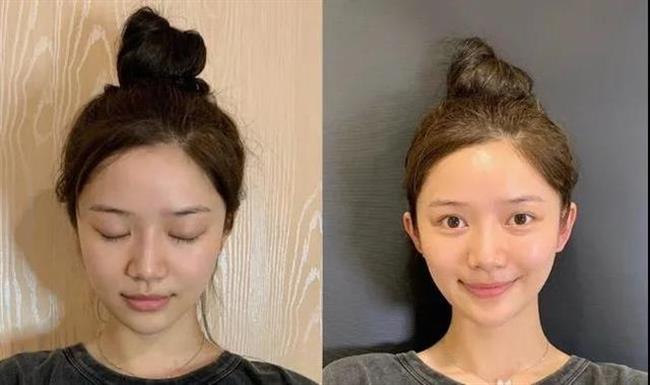Old French proverb: Beauty and folly are often companions

What constitutes a Chinese beauty?
One Weibo user, after viewing online searches on beauty with hashtags like "manga waist," "wide eyes," "pale white skin," "elf ears," and "blocking off calf nerves," answered wryly that it all sounded like Gollum, the monster from "Lord of the Rings." The comment was retweeted 30,000 times.
Elf ears and blocking off calf nerves? Those two recently trending topics shocked millions of Chinese netizens. Within a week, the hashtag "elf ear" had more than 710 million clicks, and "blocking off calf nerves" had more than 310 million.
"Elf ear" doesn't refer to the pointy ears of the elfin prince portrayed by Orlando Bloom in "Lord of the Rings." It's a procedure to inject Botox behind ears so that they appear closer to the face and presumably make it look smaller.
"Blocking off calf nerves" refers a procedure to block off the gastrocnemius muscle nerves in the lower leg so they stop functioning and make the leg appear smaller.
What is all this nonsense?
Dr Liu Xianchao, vice director of Shanghai Ren'ai Hospital's Plastic Surgery Department, calls such procedures "self-handicapping."
"These non-standard, strange surgeries are often done and promoted through non-mainstream institutes as a way to promote sales through new products," Liu told Shanghai Daily.
"Every type of surgery we do at our hospital needs to be recorded with relevant medical authorities," he explained." A legitimate doctor knows when to reject a surgery request. I will never do such 'self-handicapping' surgeries, which are irreversible."

A Weibo user posts her before-and-after picture after undergoing an "elf ear" aesthetic medicine procedure.
What's causing this beauty frenzy?
A CCTV.com survey found that nearly 80 percent of those born after 1995 have anxieties over their appearance. That obsession may well be the result of commercial trends that exploit more outlandish routes to perceived beauty.
In 2016, many netizens were quick to follow celebrity selfies showing things like measuring the waist against the 21-centimeter width of a vertical A4 sheet of paper.
Now, many netizens are calling for a halt to strange new beauty standards and the general obsession with personal appearance.
The "medical aesthetics" industry, which refers to plastic surgery aimed at enhancing beauty, not correcting legitimate body problems, also includes non-surgical treatments. It is among the latest hot investment spots.
According to a report by iResearch, the industry's value shot up to 176 billion yuan (US$28 billion) in 2019, nearly a quarter from the previous year. It showed there were about 13,000 qualified institutes in the industry, with more than 2,000 reaching beyond their qualifications and 8,000 with no qualifications at all.
"Many medical aesthetics companies got two or three rounds of financing from investors, and the trend seems to be heating up this year," Kalyn Huang, a Hangzhou-based angel investor, told Shanghai Daily.
"The mere size and the speed of new companies appearing basically mean they're gone in the first six months if they can't show a large customer base and profit pattern," Huang said. "Using social media platforms and live-streamers becomes the cheapest and fastest way for them to expand."

National and regional authorities have taken steps to crack down on crackpot beauty purveyors, but the relatively new industry keeps coming up with new ways to entice consumers.
The iResearch report also listed some of the top-clicked beauty standards sought by those consumers – among others, flawless white skin (94.6 percent), pointy chin (69.3 percent) and the thinner the better (54.8 percent).
Chinese netizens just simply call it "white, thin, and young." Many develop anxieties when they don't have those attributes.
Angela Chen is a regular visitor of "medical-aesthetics" institutes. She explains that she is constantly trying to perfect her face and body.
"I'm not doing it to please men," the 21-year-old student told Shanghai Daily. "Why can't I do whatever I want with my face and body if it pleases me?"
She added that a big part of "pleasing herself" is to have a socially agreeable image, and her idea of that image comes mostly from selfies on social media platforms and from live-streamers.
In addition to having her eyes and nose "altered" and regular skin treatments at institutes, she has had "slimming calf shots," which are injection of botulinum toxin into her lower legs. That is a legitimate procedure at most plastic surgery hospitals, but Chen said she is not satisfied with the result, so she is looking into the treatment of "blocking off calf nerves."
When she inquired about the procedure, the institute's "beauty consultant," a glorified salesperson, recommended that she also get injections of botulinum toxin to make the trapezius, or back muscle connecting head and body, tighter to straighten her shoulders.
"I'm hesitating a bit now because when that procedure became a 'hot' search topic, doctors and experts came out advising against the procedure," Chen said. "But I'm very tempted by the before-and-after pictures because they make it look so good!"
According to Dr Liu, who specializes in repairing failed plastic surgeries, this new hot search isn't even a new procedure. It was abandoned long ago due to severe side effects. And the slimming effect is also temporary, he said.
Liu said he saw such surgeries in small-scale experiments more than 20 years ago.
"These leg muscles have functions and could be important when needed," Liu explained. "One needs the support from the gastrocnemius muscles when climbing or jogging. Blocking the nerves affects one's ability to exercise. These muscles can also be made into knee joints for patients with damaged ones."
Any "slimming" effect is likely to wane as other muscles move to substitute for the lost function and gain in size.
"Elf ear" is a new phenomenon, even for a veteran doctor like Liu.
"No legitimate doctor would do such a procedure," he said. "We do have procedures to cure 'wind-catching ears,' which do the exact opposite."
"Wind-catching ears" is what Chinese call ears too close to the face. A typical example would be the pig character Zhu Bajie in the Monkey King classic story "Journey to the West."
"People need to have some normal sense of aesthetics," Liu said. "Beauty is not a fashion trend. You can't just blindly pursue fashion and change the shape of your nose every few years."
He added, "We as plastic surgery doctors study beauty standards from ancient times, and there are some commonly acknowledged ones. The most important is that beauty should be in accordance with the rest of the face and body."











